Goldendoodle Separation Anxiety: Causes & Solutions
Goldendoodles are incredibly affectionate and loving dogs, but they may become too attached to their owners, which can result in separation anxiety.
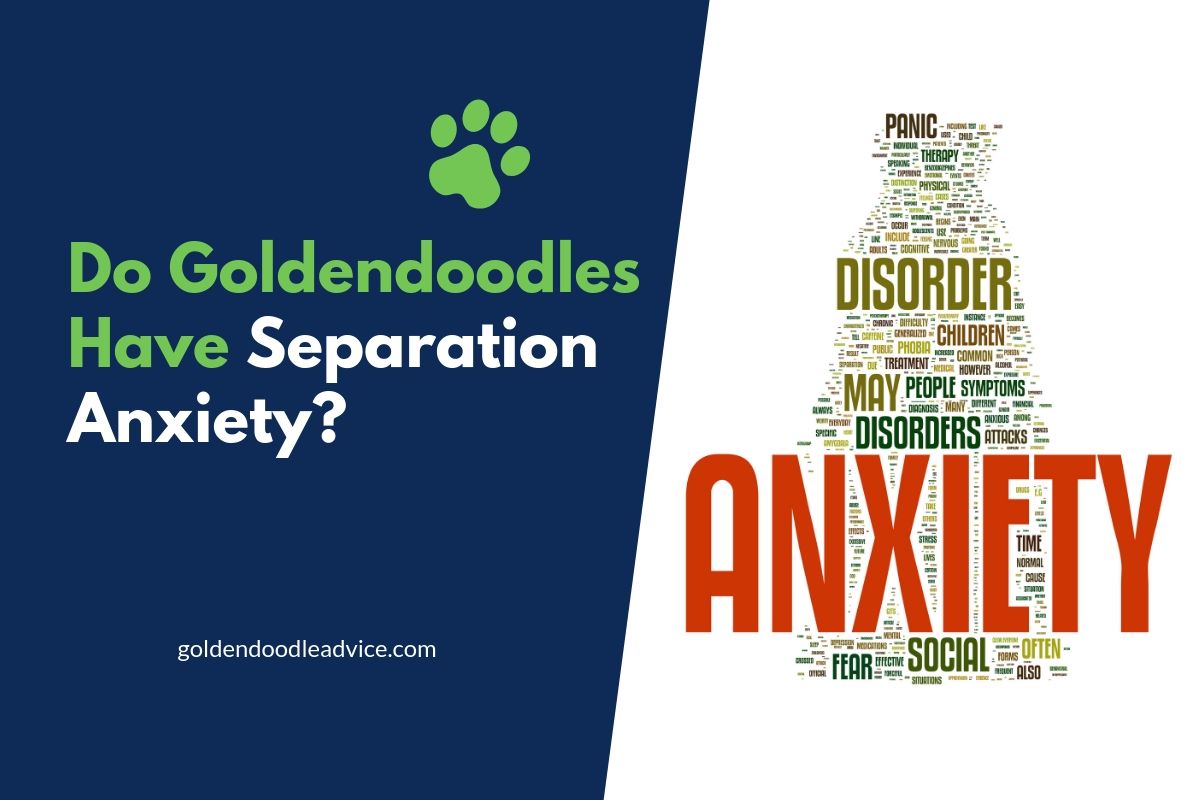
Do Goldendoodles Get Separation Anxiety?
Yes, Goldendoodles can develop separation anxiety. However, as the owner, you can influence your Goldendoodle’s separation anxiety, alleviate symptoms, and potentially prevent them from developing altogether by implementing proper training techniques.
After extensively researching Goldendoodles, I have gathered enough information to determine if this breed is prone to separation anxiety. My research has indicated that although separation anxiety is common with Goldendoodles, this is a psychological condition that can be prevented, or at the very least, alleviated.
What is Goldendoodle Separation Anxiety?
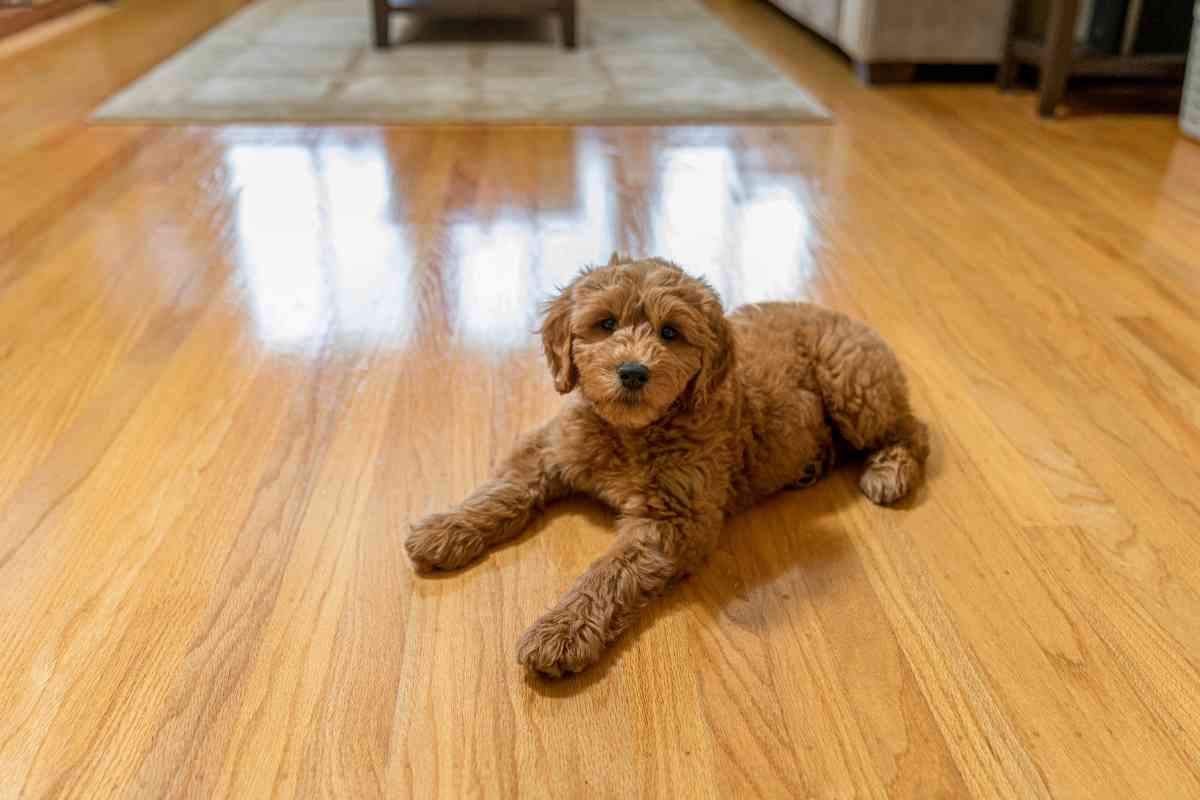
Separation anxiety is psychological stress that dogs can sometimes experience when they are away from their owners or their homes.
Dogs are known for developing in-depth relationships with their owners, which can often result in an irrational attachment that ends up causing them anxiety.
With that said, not all dogs experience separation anxiety. This is generally a psychological condition that develops incidentally, but it is also much more apparent in certain dog breeds.
Goldendoodles are particularly prone to experiencing separation anxiety, as this is an affectionate breed that demands a lot of attention.
Goldendoodles are a mix between a Golden Retriever and a Poodle – with Poodles particularly being known for dog separation anxiety and owner dependency.
As you and your Goldendoodle get acquainted, you will naturally form a bond and a close connection. As adorable as this is, you need to ensure that it does not result in separation anxiety down the line.
Luckily, if your Goldendoodle has separation anxiety, you have a lot of different options for treating and alleviating the symptoms.
In this article, I am going to go in-depth on how to identify separation anxiety in your Goldendoodle, and what you can do to prevent it.
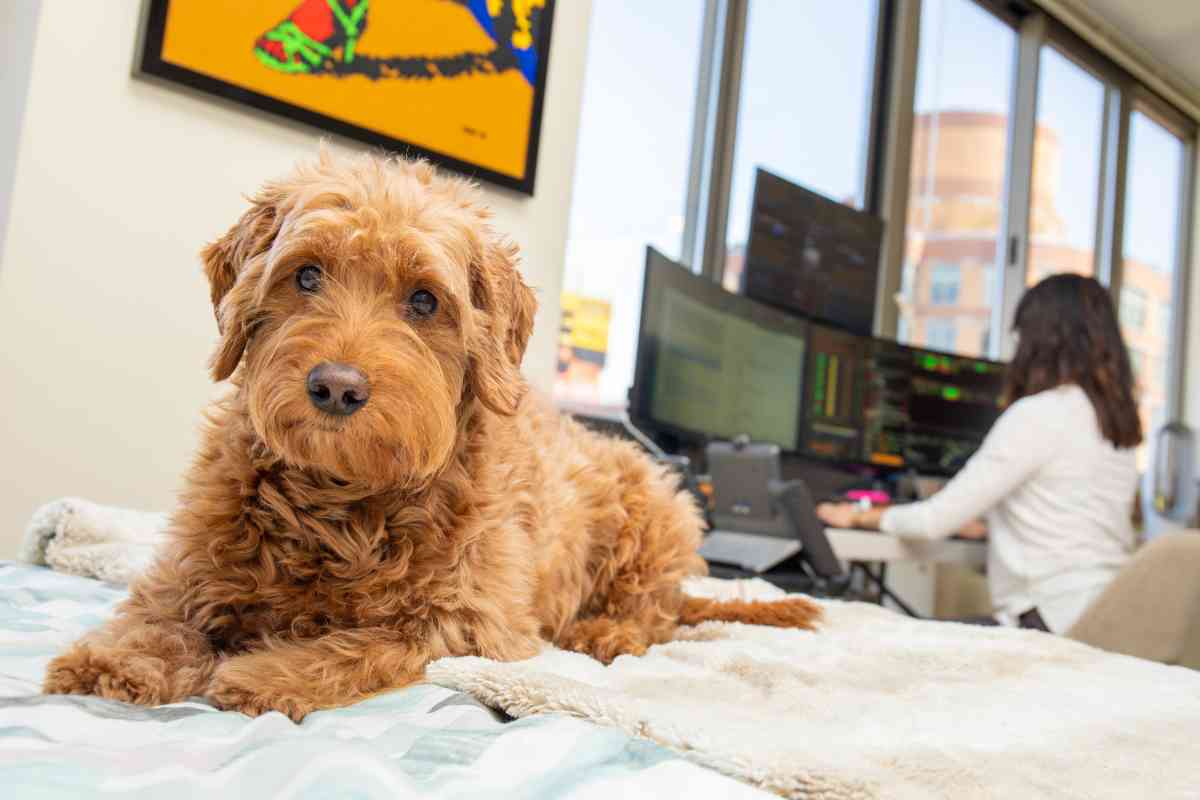
Why Do Goldendoodles Develop Separation Anxiety?
It’s important to understand that all dogs are prone to developing separation anxiety. Dogs are naturally social and loving animals that can be quite sensitive to changes in their environment.
Goldendoodles are a particularly family-oriented and owner-dependent breed. A dog with these personality traits is much more likely to experience separation anxiety if precautions are not taken early on. More on this later.
Separation anxiety is a psychological ailment that will directly interfere with your Goldendoolde’s well-being. It’s instinctive for dogs to become attached to their owners, but there is a fine line between healthy affection and obsessive neediness. At the end of the day, the more anxious your Goldendoodle is, the less happy it will be.
Luckily, there’s a lot you can do to manage and even prevent separation anxiety from developing in your Goldendoodle. However, before you can start taking action, it’s important to understand the causes and symptoms of this disorder.
While separation anxiety in Goldendoodles is predominantly connected to some form of isolation, the causes can vary from case to case – with the following being the most common sources.
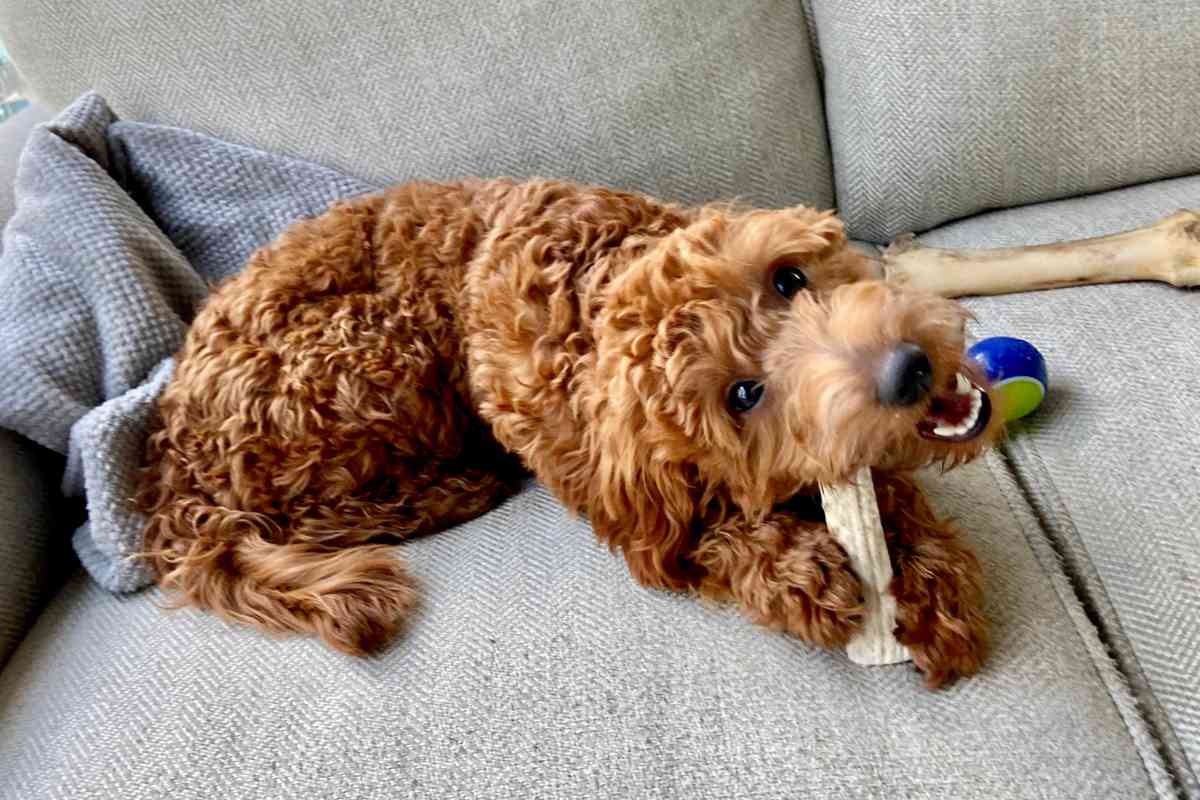
Fear of Abandonment
When you leave your home and say bye to your beloved Goldendoodle, your pup can’t distinguish the difference between you going to work for the day and abandoning it. This is particularly the case with shelter dogs that have not been properly looked after by their owners.
If your Goldendoodle had better communication skills, you could ensure your dog that you will be back soon and that there is nothing to worry about.
Unfortunately, this is not the case.
You need to consider that every time you leave the house, your Goldendoodle is most likely thinking that you are gone for good. In extreme cases, some Goldendoodles can’t even handle being in a different room from their owners.
Residence & Owner Changes
Goldendoodles will not respond well to significant changes in their lives, and understandably so.
If you have recently moved into a new residence, your pup’s separation anxiety may be due to the change in environment.
In addition, if you adopted a Goldendoodle from a shelter, anxiety in general should be expected.
Your new pup may have a hard time transitioning to its new owner, which is a very common reason for separation anxiety.
Schedule Changes
Goldendoodles love a stable routine. When your pup gets used to a certain schedule it gets comfortable with its day-to-day life because it knows what to expect.
Sporadic schedule changes and inconsistent routines put your Goldendoodle on edge, and it will likely seek comfort by craving more attention and affection from you.
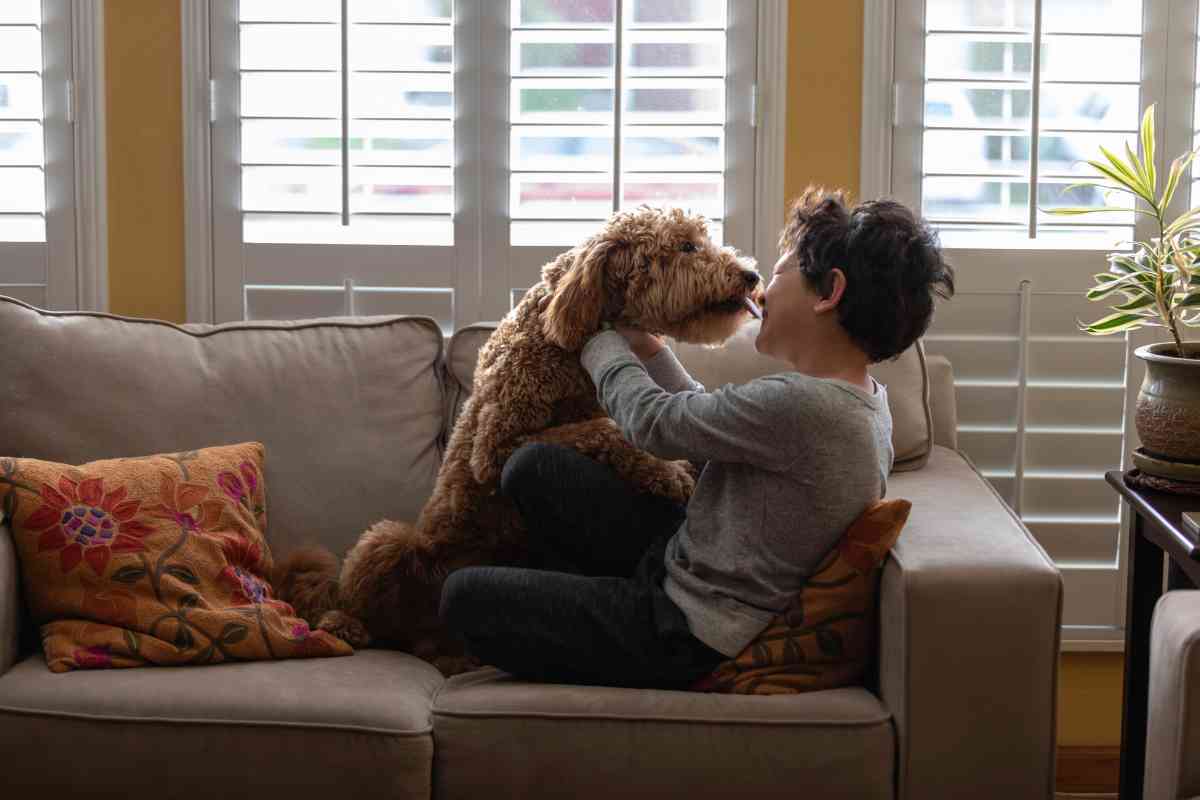
Hereditary Disposition
Some dogs are much more prone to experiencing separation anxiety – with Goldendoodles being a notorious breed for this condition.
Unfortunately, this kind of hereditary disposition, makes it much more likely for your Goldendoodle to develop symptoms. As an affectionate breed, Goldendoodles want to be around their owners constantly, which greatly increases the chances of separation anxiety in your pup’s life.
Pack-Oriented
Dogs are used to being part of a pack due to their wolf ancestry. This implies that the idea of community and staying close to others is ingrained in their DNA.
Although we successfully domesticated dogs, we have not changed their natural instincts. Your Goldendoodle may be less intimidating than a wolf, but it is still programmed to think like one in so many ways.
When you introduce your Goldendoodle into your home, it may develop separation anxiety simply because it’s so used to being around other members of a pack.
You want to develop the same feeling of community that your Goldendoodle is used to by making your pup feel right at home with you by its side.
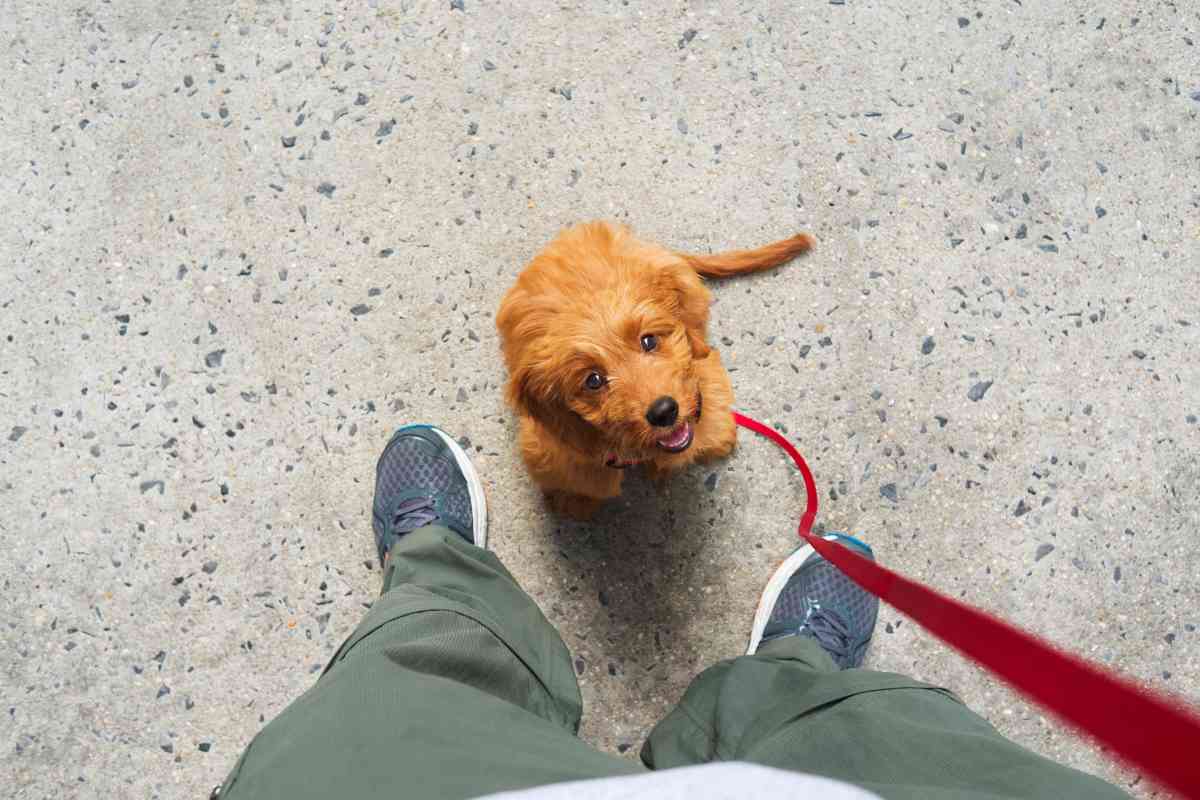
Past Trauma
If you bought your Goldendoodle and have been with it ] since day one, this may not apply to your pup. However, if your Goldendoodle has a history prior to entering your home, don’t disregard potential past traumas as being a reason for separation anxiety.
Shelter dogs, regardless of their breed, often have separation anxiety when getting acquainted with a new owner due to previous experiences.
Poor Training
Although separation anxiety can be caused by a lot of different factors, the bottom line is that poor training can increase the chances of these symptoms developing.
By properly training your Goldendoodle early on, you can significantly reduce the effects of anxiety and even prevent the condition entirely.
Is Goldendoodle Separation Anxiety Really a Problem?
There’s a stark difference between a Goldendoodle that is experiencing separation anxiety and a pup that simply misses its owner. Virtually every dog would much rather have their owner by their side than at work.
With that said, it’s perfectly natural for a dog to express some form of manageable worrying about their owner when they are away from home.
The main difference between casual worrying and separation anxiety is the level of distress that your Goldendoodle experiences when you are gone.
Separation anxiety can take a huge toll on a dog’s psychological health, and you will likely notice it very quickly if the symptoms are severe. If your Goldendoodle is experiencing legitimate separation anxiety that is interfering with its happiness and well-being, then it’s absolutely a problem.
New pet owners quickly discover that taking care of a dog is almost on par with taking care of a child.
There are complex emotions that need to be addressed and needs that need to be met for a dog to be happy.
That is why training your Goldendoodle to cope with its separation anxiety or taking measures to prevent it from developing in the first place, should be an essential part of your dog training.
Symptoms of Goldendoodle Separation Anxiety

To understand when separation anxiety actually becomes a problem, you need to know which symptoms to watch out for so that you can take action and case study your pup.
Keep in mind that you should ideally be watching out for more than one symptom when determining if your Goldendoodle has separation anxiety.
There are some key behaviors tied to this condition, and you can take action to manage and prevent this condition based on your pup’s specific symptoms. Keep an eye out for the following symptoms of separation anxiety:
- Barking
- Whining
- Urinating & Defecating
- Escaping
- Pacing
- Trembling & Shaking
- Digging
- Chewing and Destroying
Whining & Whimpering
If your Goldendoodle is whining and whimpering, it may be trying to vocalize its worrying to you.
You should not immediately correlate any whining and whimpering with separation anxiety, as this is still normal behavior from a dog that wants a treat or to go to the park.
Instead, observe whether the behavior happens when you are about to leave the house or when you return home.
In addition, make sure that your pup is not just happy to see you when you get home, as there is a difference between cries of joy and legitimate whining and whimpering.

Trembling
Although we classify separation anxiety as a psychological condition, it can often manifest itself physically in the body. An extreme symptom of separation anxiety is if your Goldendoodle is trembling or shaking as a response to your being away.
This can sometimes be a tough one to spot when you are away from home, which is why I recommend having someone observe your pup when you leave the house.
Destruction
If you are coming home to a home that has been torn apart, this may be a sign of separation anxiety. Goldendoodles will often cause destruction at home as a form of protest against their owners leaving the house if they are legitimately experiencing separation anxiety.
Your pup may be doing this to send you a message, or it could be using destruction as a coping mechanism for its anxiety.
Urinating and Defecating
Did you potty train your Goldendoodle properly but it still seems to leave a number 1 or 2 on the floor whenever you leave the house? Your Goldendoodle may be doing this out of fear, not to spite you.
When your pup experiences severe separation anxiety, a natural response to its fear may be to leave one on your carpet.
Barking & Howling
Goldendoodles are known for letting out the occasional bark and howl, but it should not be a common theme in the house.
Barking and howling is another technique that Goldendoodles use to express their discontent with you leaving them alone.
If the barking and howling only becomes noticeable when you leave the house, then this may be a sign of separation anxiety.
Escaping
So long as your Goldendoodle is not agoraphobic, it may try to escape the house when it’s feeling under stress due to separation anxiety.
Dogs that are worried about being left alone may look for escape routes, and they will use them if they can.
If your home is secured, this could just result in some damage around the house. However, if the house has any vulnerable openings, your Goldendoodle may take advantage of them to escape.
Can An Anxious Goldendoodle Be Left Alone?
In most cases, yes. Being alone is something that your Goldendoodle simply needs to get used to – whether they like it or not.
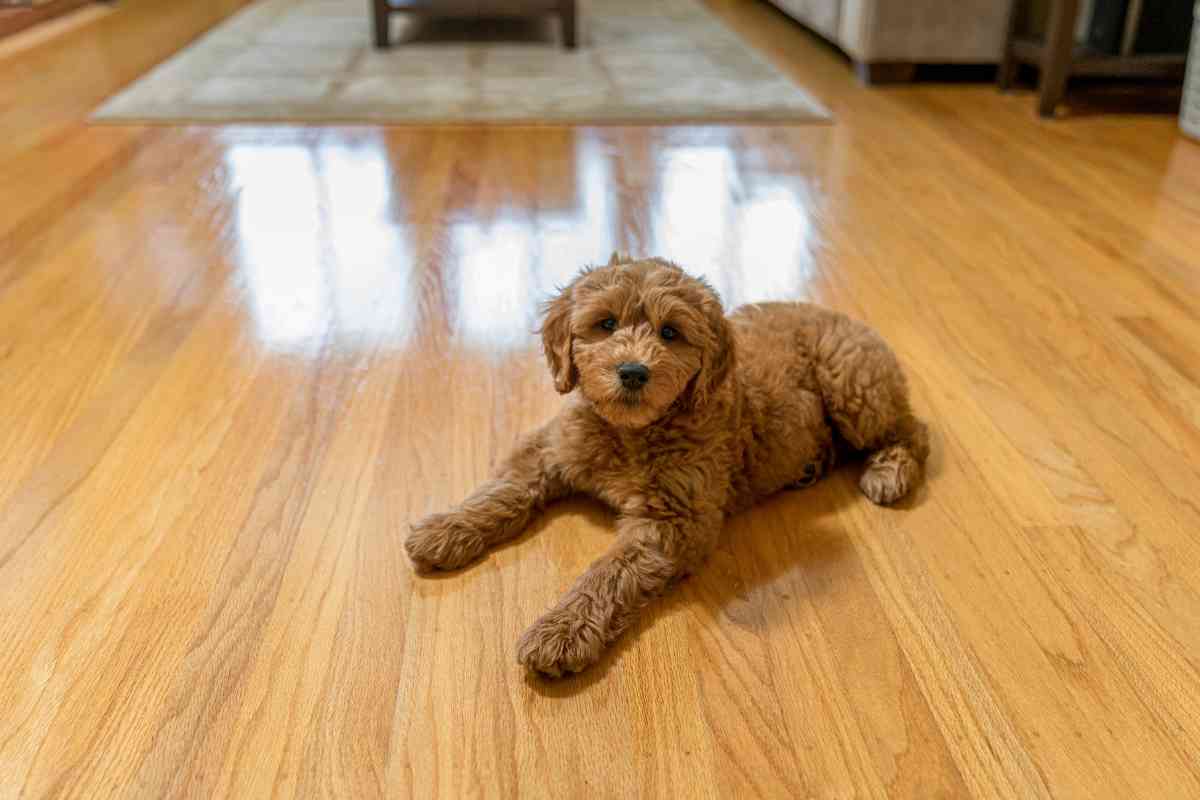
At the end of the day, your Goldendoodle’s anxiety is not a reason to lock yourself in your home or drag your dog with you everywhere you go. In fact, leaving your Goldendoodle alone responsibly is one of the best ways to avoid separation anxiety.
Your Goldendoodle will likely bark, whimper, and protest when you leave the house, but this is not a reason to stay home.
You need to evaluate the symptoms of your pup’s separation anxiety carefully. If your Goldendoodle becomes destructive, you may need to take measures to keep them from tearing your house apart, such as hiring a dog sitter.
However, most importantly – when you notice symptoms of separation anxiety in your Goldendoolde, you should begin taking steps to manage this condition immediately. The longer you put off treating your dog’s anxiety, the more challenging it will be later in life.
How to Prevent & Alleviate Goldendoodle Separation Anxiety
No owner wants to see their beloved Goldendoodle go through separation anxiety.
This can be a truly traumatic experience for a dog, and it will inhibit its happiness, especially if it’s not treated and addressed.
While your Goldendoodle’s separation anxiety may seem like a nuisance at times, you need to keep in mind that this condition is particularly taxing on your pup. Anxiety is not a pleasant thing to experience and it prevents your Goldendoodle from being truly happy.
Managing this condition can be difficult, but it’s by no means impossible. By taking measures to alleviate this condition, you can drastically reduce symptoms and improve your Goldendoodle’s well-being and state of mind.
I find prevention is much more effective than alleviating symptoms that have already become apparent.
Managing separation anxiety symptoms is something I normally encourage Goldendoodle owners to do once their dog is past adolescence. While managing can be very effective, the best way to deal with separation anxiety is to try to prevent it from developing in the first place.
You should start this from the minute you welcome your Goldendoodle into your home. Your Goldendoodle’s puppy years are a crucial time to take care of your dog’s mental health, and you can potentially prevent separation anxiety completely by properly taking action right away.
However, taking measures to reduce or eliminate your Goldendoodle’s separation anxiety is highly recommended, regardless of when symptoms started. Try the following methods to prevent or alleviate your Goldendoodle’s separation anxiety.
Crate Training

Although this may seem like a counter-intuitive approach for combating separation anxiety, it is hands down one of the most effective.
Crate training your Goldendoodle, while they are a puppy, is a great way to encourage them to feel comfortable alone and to reinforce the idea of their crate (ultimately your home) as a safe place.
While your pup may cry and whine a bit at first, they will get used to the crate very quickly and learn to like it. This is one of the most effective ways to prevent separation and anxiety and create positive habits in Goldendoodle puppies.
Alone Time
Much like crate training, consistent alone time makes it easier for your Goldendoodle to cope with you being further away. This does not necessarily mean that you even need to leave the house.
Simply creating space and distance between you and your puppy will make them feel more comfortable being alone. Many vets and dog trainers recommend setting up a barrier or baby gate and isolating your Goldendoodle to a specific part of the house during the first few months.
Teach your dog independence and to be comfortable being left alone or separated from you by a baby gate or door.
– Kenneth Martin DVM, DACVB, and Debbie Martin, LVT, VTS
Exercise
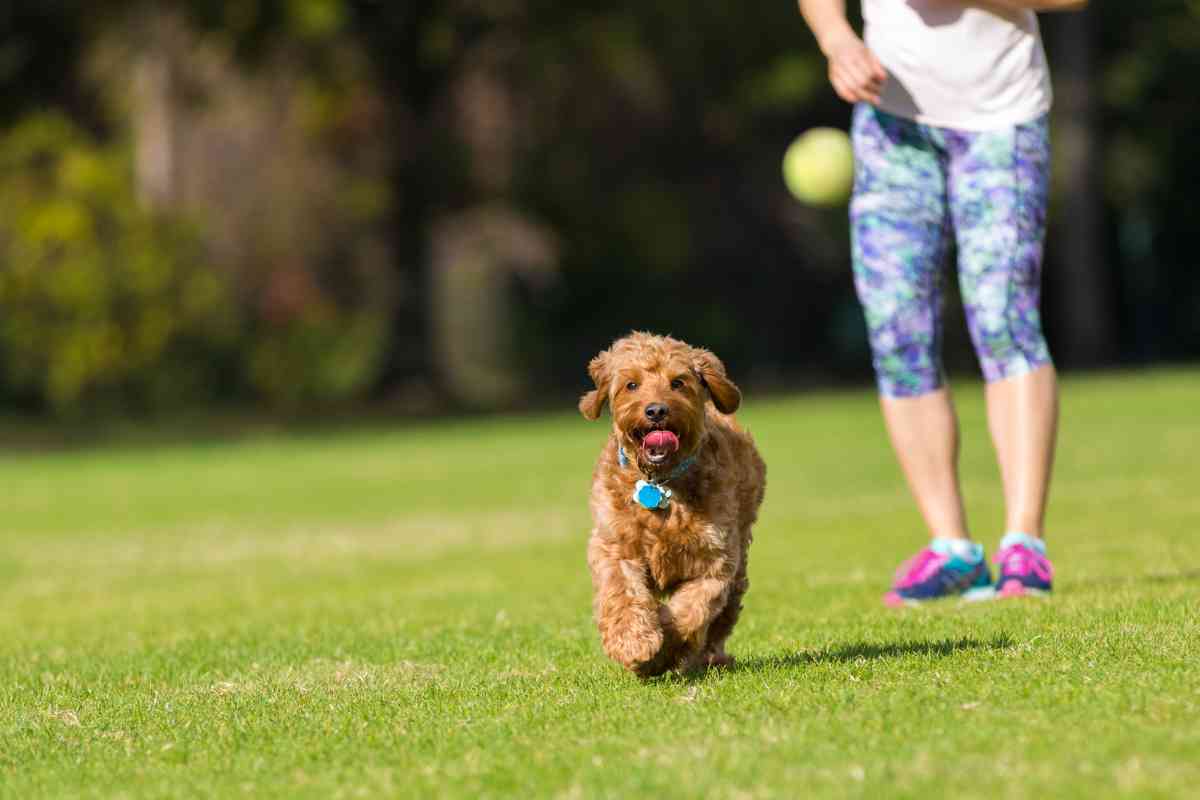
Exercise is beneficial to your Goldendoodle in so many ways. Spending time outside and staying active will encourage physical and mental health, much like it does in humans.
“Meet your dog’s physical, social, and exploratory needs each day through routine…. leashed walks, & environmental enrichment”
– Kenneth Martin DVM, DACVB and Debbie Martin, LVT, VTS
Any type of physical exercise has proven to be one of the most effective ways to improve physical and mental health, as well as combat anxiety – in both humans and dogs. Your Goldendoodle loves going for walks and spending time outside.
You should be exercising your Goldendoodle at least two hours per day to drain its energy and mitigate anxiety symptoms.
Encourage Relaxation
If you have an energetic Goldendoodle that constantly seeks stimulation and excitement, this can cause them to become anxious when they do not have anyone to entertain themselves with.
While playing and exercising is vital to managing separation anxiety, your four-legged friend also needs to learn to feel comfortable when there’s nothing to do. You can reinforce this by relaxing with your Goldendoodle instead of having a never-ending play session.
“Catch your dog being calm and when the dog is ignoring you, reward him with calm and pleasant attention”
– Kenneth Martin DVM, DACVB, and Debbie Martin, LVT, VTS
Spend time together being couch potatoes and also enjoy being apart from one another when at home as well – followed by a treat or two for good behavior.
Build a Nest
Your Goldendoodle should have its personal space within your home – a place it can nest and relax when you are not there. Dog mats and puppy pillows are a great solution for this!
Encourage your Goldendoodle to feel comfortable in its nest so that it has somewhere to hang out when you’re not there. This will prevent your pup from pacing and being restless.
Affection
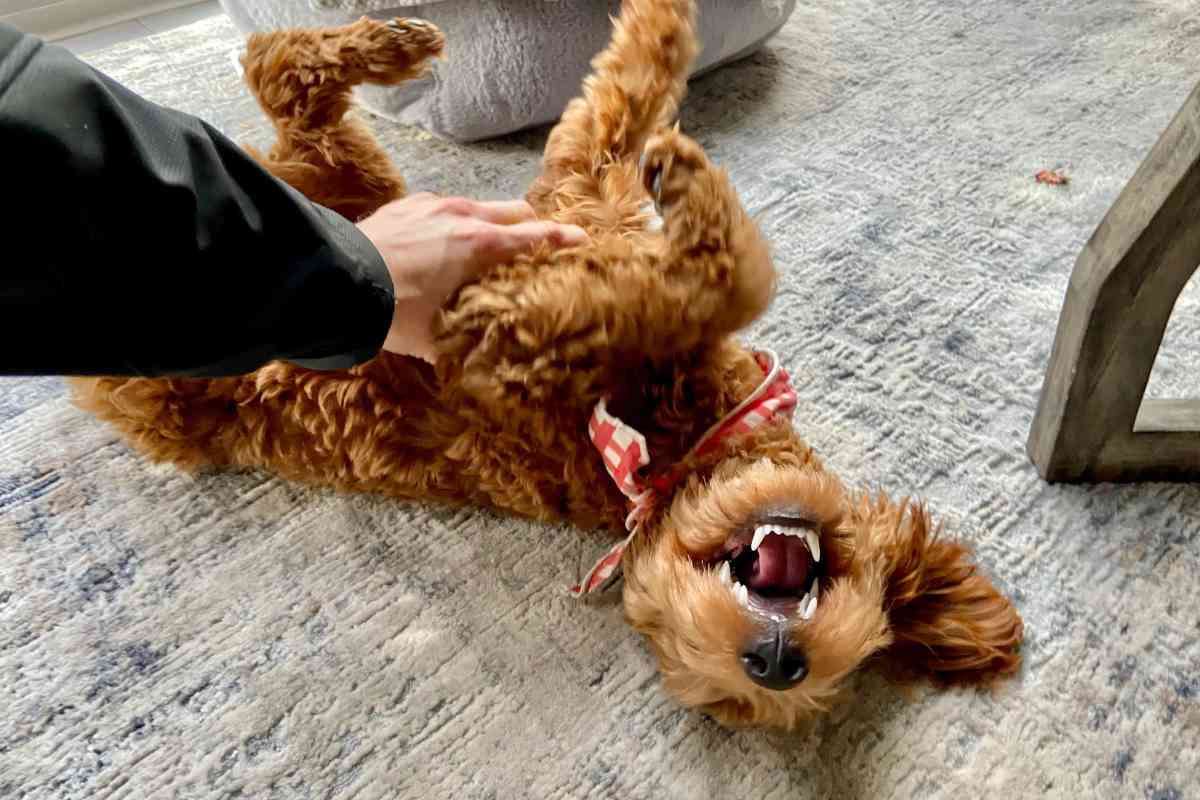
Goldendoodles are very affectionate dogs that love to display their love for their owners. You need to reciprocate that love and affection to your Goldendoodle to build trust and a strong connection.
You can then use affection as a
That said, don’t overdo it. Affection should be shown consistently, but not to the point that your Goldendoodle relies on it 24/7, as this can actually increase the likelihood of separation anxiety.
Ignoring
Although it can be hard to ignore your adorable Goldendoodle, this is one of the most effective ways to prevent separation anxiety. Goldendoodles crave and need attention, but when it’s done in excess, this can encourage symptoms of anxiety.
Your Goldendoodle needs to learn to feel comfortable being alone. If you are constantly showing your puppy affection and attention, they will grow accustomed to it and feel anxious when you are not around.
Socialize Your Goldendoodle
Spending time with people and other dogs can help reduce the chances of separation anxiety. If the only person a Goldendoodle makes contact with is its dog owner, it may become overly attached and dependent.
Take your Goldendoodle out on play dates and take frequent trips to the park. Let your dog get familiarized with the outside world and encourage it to be playful and social.
Leave & Return
Your Goldendoodle is going to feel much more comfortable with the idea of you leaving the house if it’s reassured that you are going to come back.
That is why you should practice leaving and returning as a training strategy with your Goldendoodle. Reinforce the idea that when you leave the house, you will return.
Try leaving the house for small intervals and then immediately returning. Reinforce this by giving them their favorite treat so that they are making positive associations with you leaving the house.
Toys
Goldendoodles are very playful and love to have fun with their owners. However, when you are not there to entertain your pup, it will start to get bored and restless – which results in anxiety.
Goldendoodles love having toys around the house. This is a great way to keep your pup happy when you are around, and it’s also an approach to keep your Goldendoodle entertained when you are not.
Keeping the mind active is one of the best ways to prevent worrying and anxiety. Buy a handful of different toys to find out which one your Goldendoodle likes the most and ensure that it’s available when you leave the house.

Play Before Leaving
Don’t turn leaving the house into an anguishing experience for your Goldendoodle. Before you head out, squeeze in another quick play session with your pup, as this will make your absence more manageable.
Hire a Dog Sitter
If you’ve got an older Goldendoodle with severe separation anxiety symptoms, you should consider hiring a dog sitter to be at the house when you are away.
I would not recommend doing this as a long-term solution, but it can be a very useful strategy while you are still learning how to manage the symptoms.
While a dog sitter may not completely satisfy your Goldendoodle’s needs, they will be there for entertainment and to ensure your house doesn’t get torn apart.
Professional Dog Training & Behavioral Therapy
We’re not all cut out to be dog trainers, and sometimes dealing with your Goldendoodle’s anxiety on your own can feel overwhelming. If you are having trouble managing the anxiety symptoms, I would recommend hiring a dog trainer that specializes in behavioral therapy.
Seeking expert knowledge from a trained professional can make a huge difference in your Goldendoodle’s condition, especially if you have already tried the above-mentioned techniques.
Supplements & Veterinarian Assistance
When anxiety symptoms become very severe and unmanageable, you should take your Goldendoodle to a veterinarian. This condition can greatly vary, and some dogs experience anxiety much more than others.
“Have your dog evaluated by your veterinarian… Your veterinarian will ask about the history of the behavior and may perform diagnostic tests before making a behavioral diagnosis.”
– Kenneth Martin DVM, DACVB, and Debbie Martin, LVT, VTS
A professional vet will be able to give you in-depth instructions on how to deal with the symptoms and they may even recommend prescribing medication and supplements, if necessary.
Talk to a Vet
If your Goldendoodle is experiencing severe anxiety that you are having a hard time dealing with on your own, I would encourage you to seek help from a veterinarian.
Separation anxiety can be extremely taxing for you and your Goldendoodle. A veterinarian will give you personalized advice on how to cope with the anxiety and will either provide better tactics or prescribe medication.
Key Takeaways
- Yes, Goldendoodles can develop anxiety.
- As the owner, you can influence your Goldendoodle’s anxiety, alleviate symptoms, and potentially prevent them from developing altogether.
- Use the following tactics to help your Goldendoodle cope with anxiety: crate training, exercise, affection, leave & return, toys, and play before leaving.
- If you are having a hard time managing your Goldendoodle’s anxiety on your own, consider seeing a veterinarian for personalized advice and assistance.
- Goldendoodle anxiety is generally caused by fear of abandonment, schedule changes, hereditary disposition, and poor training.
- Symptoms of Goldendoodle anxiety include: barking, whining, urinating & defecating, escaping, pacing, trembling & shaking, digging, and chewing & destroying.
- You can manage your Goldendoodle’s anxiety with routine exercise, toys and entertainment, nest building, showing affection, hiring a dog sitter, professional dog training, and veterinarian assistance.